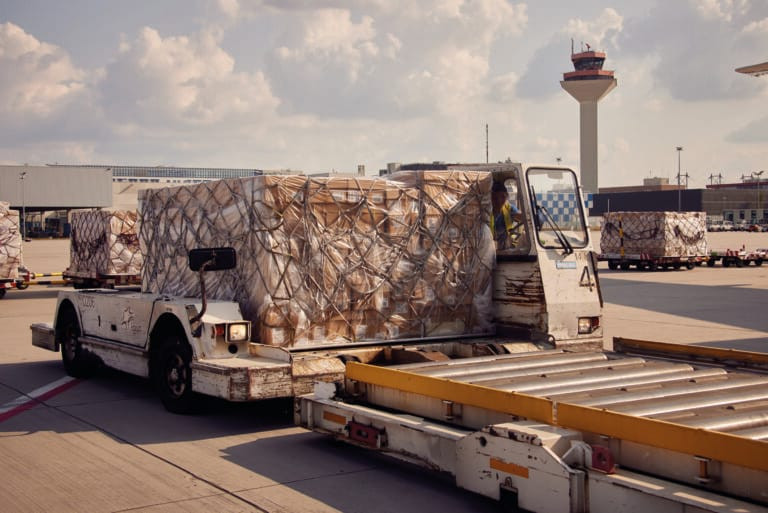- Frankfurt Airport is evolving beyond traditional cargo handling, serving as a collaborative hub that connects carriers, logistics providers, and shippers across Europe, supported by digital systems that optimise global supply chains in real time.
- Flexibility, modular infrastructure, and automation are key priorities, enabling the airport to adapt to rising e-commerce volumes, smaller parcel flows, and more efficient, technology-driven operations while keeping people central to the process.
- Europe’s competitive advantage lies in a dense ecosystem of companies, research hubs, and talent, with sustainability seen as an opportunity through initiatives like recycling cargo plastics, reusing pallets, and reducing operational waste.
As one of the continent’s busiest cargo hubs, Frankfurt Airport’s role in shaping the future of airfreight has never been more pivotal. With global trade flows shifting, e-commerce surging and sustainability climbing the agenda, Europe’s airfreight market is in a period of transformation.
The role of airports is no longer limited to moving goods efficiently. Increasingly, they are expected to function as hubs for collaboration, connecting carriers, logistics providers and shippers across the continent. In this context, digital systems are playing a key role, enabling operators to coordinate with partners around the world in real time and optimise complex supply chains.
“Back in the past, we were always hearing that we are growing and we are number one,” Denis de Farias Duarte, Vice President for Cargo Development at Fraport AG, says. “But to be number one, you need all the community together.”
Infrastructure alone, while still important, is no longer the sole measure of a hub’s competitiveness. Flexibility and adaptability are emerging as critical attributes, allowing airports to adjust quickly to changes in demand, such as the growing prominence of small parcels driven by e-commerce. Modular designs, digital integration, and automated systems are increasingly being deployed to ensure that cargo hubs can scale efficiently without compromising operational performance.
“Airports are meeting points, not only for one person, but for many people from different communities,” he explains. “In the supply chain you have so many people connected without knowing it. Our role is to give space for those voices, those ideas, to connect.”
That means offering more than physical capacity. Digital systems, Duarte says, are vital to link far-flung partners in real time, whether in China, North America or within Europe. “We build infrastructures to enable people to connect,” he says.
“We connect people, but we connect also freight to each other — they are not able to talk, so we need systems, we need people to go beyond.”
Automation, adaptability and the future
The future of airfreight, Duarte believes, is less about massive new warehouses and more about flexible, modular design. “Formally, we needed bigger space for pallets,” he says. “Now we need smaller spaces for parcels, like in e-commerce. So we have to be adaptable — and adaptability you can only gain when people drive this together.”
Drawing on his past experience in Asia, Duarte recalls seeing Shenzhen airport transform over two decades from a small local hub into a global powerhouse. The lesson, he argues, is clear: embrace technology early and keep evolving. “In the future, air cargo is going to be much more automated,” he says. “Automated vehicles will transport goods directly, without using so much manpower. Many repetitive tasks are well suited for automation.”
But while machines will take over routine tasks, Duarte insists that people remain central. “Automation gives space for people to do more interesting things, to use their time more efficiently,” he says.
Europe’s competitive edge — and the role of sustainability
Despite global turbulence, Duarte is bullish about Europe’s prospects, and Frankfurt’s in particular. The secret, he says, is not only infrastructure but also talent. “I was really surprised to see how many family-based, smaller companies here are exporting very large amounts,” he notes. “It’s not just the big enterprises driving growth. Add to that Frankfurt’s location — two major autobahns, rail connections and, of course, the airport itself — and everything is connected.”
This dense ecosystem, reinforced by nearby universities and research hubs, creates what Duarte calls an “innovation hotspot” that supports long-term competitiveness. Yet he insists growth must be aligned with sustainability goals. “We have to listen to our customers, understand their requirements and put everyone together to find solutions,” he says. “For example, recycling cargo plastics, re-using pallets and reducing waste. I don’t see sustainability as a challenge — it’s an opportunity for all of us.”




